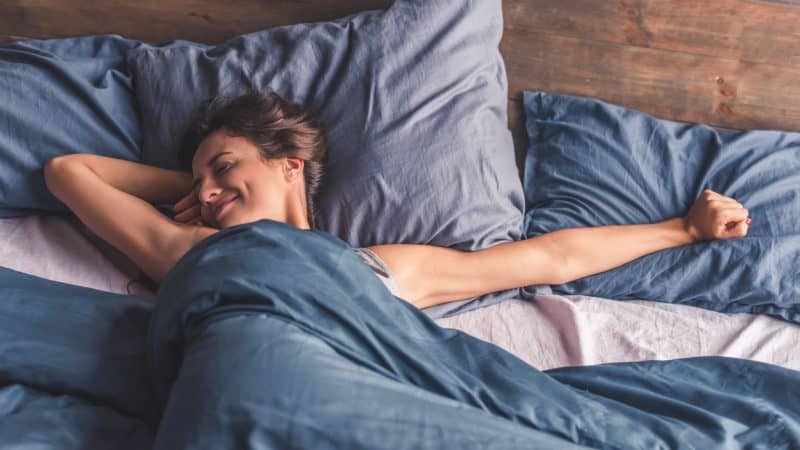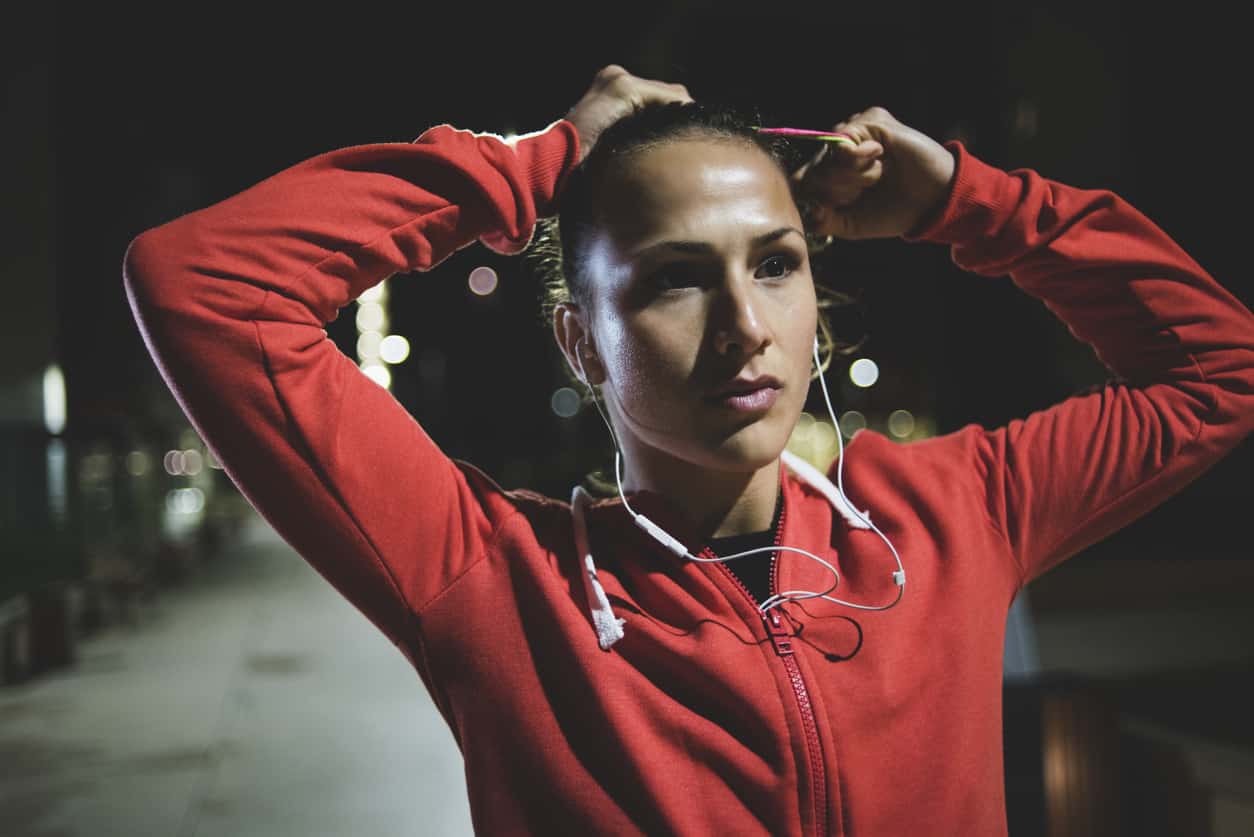This Is the Best Time of Day to Exercise For Better Sleep
This Is the Best Time of Day to Exercise For Better Sleep
The link between better sleep and exercise is well known. We’ll tell you the best time of day to exercise so you can rest easy and wake up refreshed.
As well as whole host of benefits, from weight control to fighting depression, exercise is also important for getting a good night’s sleep.
In fact, just 30 minutes of exercise three times a week was enough to improve sleep quality for sedentary women suffering from insomnia.
So, the jury’s in – working up a sweat during the day is key to sleeping soundly at night. But, is the effect is the same regardless of when you exercise? After all, it’s not unreasonable to assume that a late night exercise session might leave you too wired to fall asleep.
While it is true that the timing of your workout can have an influence on sleep, there are lots of different factors to consider. Read on to find out the best time of day to exercise for better sleep.
The Connection Between Exercise and Sleep Quality
It’s safe to say there’s little debate over the fact that exercising helps you sleep better.
In a recent poll, the National Sleep Foundation found that up to 67 percent of exercisers report getting a good night’s sleep. Only 39 percent of non-exercisers were able to report that they experienced the same high sleep quality.
And, the more intense the workout out, the bigger the difference. Seventy-two percent of vigorous exercisers said that they rarely or never experienced symptoms of insomnia. In contrast, 50 percent of non-exercisers said that they often wake up early, while 24 percent experience insomnia nearly every night.
Further research studied over 3,000 adults who tried to complete the recommended 150 minutes of physical activity each week. These participants showed a 65 percent improvement in sleep quality. They also reported feeling less sleepy during the day.
And, this effect runs both ways too. Getting enough sleep means that you feel well-rested the following day and have enough energy to exercise. On the other hand, feeling tired after a bad night’s sleep is more likely to make you skip your workout.
But, what’s the best time of the day to get active for optimum sleep quality? Here, we compare how exercising in the morning, afternoon and at night affect how well you sleep.

Working Out in the Morning
Many people favor exercising in the early hours because it ensures that you’ve got your workout in before the demands of the day take hold. And, making the effort to wake up early and work out means you’re sure to reap the benefits of better-quality sleep.
In fact, working out in the morning has the added bonus of even deeper sleep at night. One study compared participants who worked out at 7 AM, 1 PM, and 7 PM for three days per week. Those who worked out at 7 am experienced longer, deeper sleep than the other exercise groups.
The same study also found that morning exercise has a greater effect on reducing blood pressure. During sleep, your blood pressure dips by around 10 to 20 percent.
The 7 AM exercisers experienced a 25 percent drop at night and a 10 percent reduction in blood pressure throughout the whole day. This drop in blood pressure is associated with deeper sleep as it one way that the body restores itself during the night.
And, if you exercise outside in the morning, you’ll also benefit from a dose of sunshine. Not only does this boost your vitamin D levels, but it also helps regulate your circadian rhythm for a more consistent sleep/wake cycle.
Working Out in the Afternoon
If hitting the gym at the crack of dawn isn’t for you, don’t worry. Working out in the afternoon also has benefits, for both your performance and your sleep quality.
By the afternoon, your body has had more of a chance to warm-up. In fact, it’s one or two degrees warmer than when you first get out of bed.
As a result, your muscles can work more efficiently and there’s less chance of you injuring yourself. You’ll body will be supple and more flexible. Dance steps will come easier and you’ll be more adept at complex full-body movements like swinging a tennis racket.
In addition, afternoon workouts can also help you fall asleep more quickly and wake up less often during the night. This is because exercise raises your body temperature for around four or five hours. Following this period, your core temperature decreases, sending a signal to your body to start preparing for sleep mode.
Exercising in the afternoon is also a great way to release stress and tension after a hard day at work. Focusing on the physical later in the day allows your body to take over from your brain. This then reduces the possibility of being kept awake at night by an anxious or busy mind working overtime.
Working Out at Night
Maybe exercising in the morning isn’t for you. And perhaps an afternoon workout is impossible with your schedule. Whatever your reasons, many people find a late night sweat session the most convenient for them.
But, does late night exercise have the same positive effect on sleep quality? Or, is it possible that working out before bed actually negatively effects your sleep?
There’s no single answer to these questions. It can depend on the workout you do, but when to exercise depends more on your individual reaction.
For example, doing yoga and Pilates at night is said to be beneficial for those kept awake by stress. This is because of the stretching movements and focuses on breathing help you to relax and unwind before bed.
Also, strength training at any time of the day has been found to improve sleep quality. That said, the time of day that you lift weights does make a difference to how your sleep improves.
Those who get their pumps and curls out of the way in the morning tend to drift off to sleep quicker than night exercisers. But, those who pump iron at night wake up less often and sleep better overall.
But, what about cardio before bed? It’s logical to think that a high-energy workout that has your heart pumping and increases your body temperature is not the way to ease yourself into a pre-sleep state. And it’s true – for some people exercise before sleep can cause insomnia.
But, that doesn’t mean that night-time cardio should be off-limits. The National Sleep Foundation found that exercisers report improved sleep regardless of when they worked out. In fact, in one study, male cyclists rode stationary bikes for three hours up until 30 minutes before bedtime and had no trouble sleeping.
Make Your Workout Schedule Work for You
To reap the many benefits of exercise, improved sleep included, your workout schedule must have all of ‘the three Cs’ – commitment, convenience, and consistency.
Commitment means making a plan and sticking to it. But, just as your plan is individual to you, so is your idea of convenience, as is how you can ensure consistency. If rolling out of bed and into the gym is the only way you can stay consistent, great. But, if it’s convenient for you to work out at 9 pm and you sleep well afterwards, don’t feel you have to change your routine.
Likewise, if you find that your workout schedule isn’t working for you, don’t be afraid to change it. Many people swear by working out first thing as there’s less going on to side-track your best efforts to get a workout in. But, if you feel sluggish and tend to struggle through your morning workouts, don’t feel obliged to continue exercising early.
You might find that you feel more energetic in the afternoon or evening. Not only is your body temperature higher during this period, but your endurance also peaks around this time of day. And, getting outside for a mini workout at lunchtime is also a great way to boost your afternoon productivity.
Feel free to experiment with exercising at different times of the day and use an activity tracker to analyze your sleeping patterns. This way, you’ll know for sure which time of day is best for you to exercise.
And, if it’s more convenient to work out later, but you experience reduced sleep, try playing around with your schedule. Move your workouts around by half an hour or so and see what time works best for you. After some trial and error, you’re sure to find when to exercise for the best sleep quality.
The Best Time of Day to Exercise for Better Sleep
Some people are firmly in the early-exercise camp. Others say that a moonlit jog is the only time to get in their daily activity.
Whichever side you’re on, you’ll be pleased to learn that the best time of day to exercise is whenever it’s most convenient for you. And, whatever time of the day – or night – you prefer to exercise, you’ll still sleep soundly come bedtime.
Our 21 Day Body Transformation Challenge combines diet and exercise to transform your look. If you want to turn heads for the right reasons, find out more here.





Recent Comments